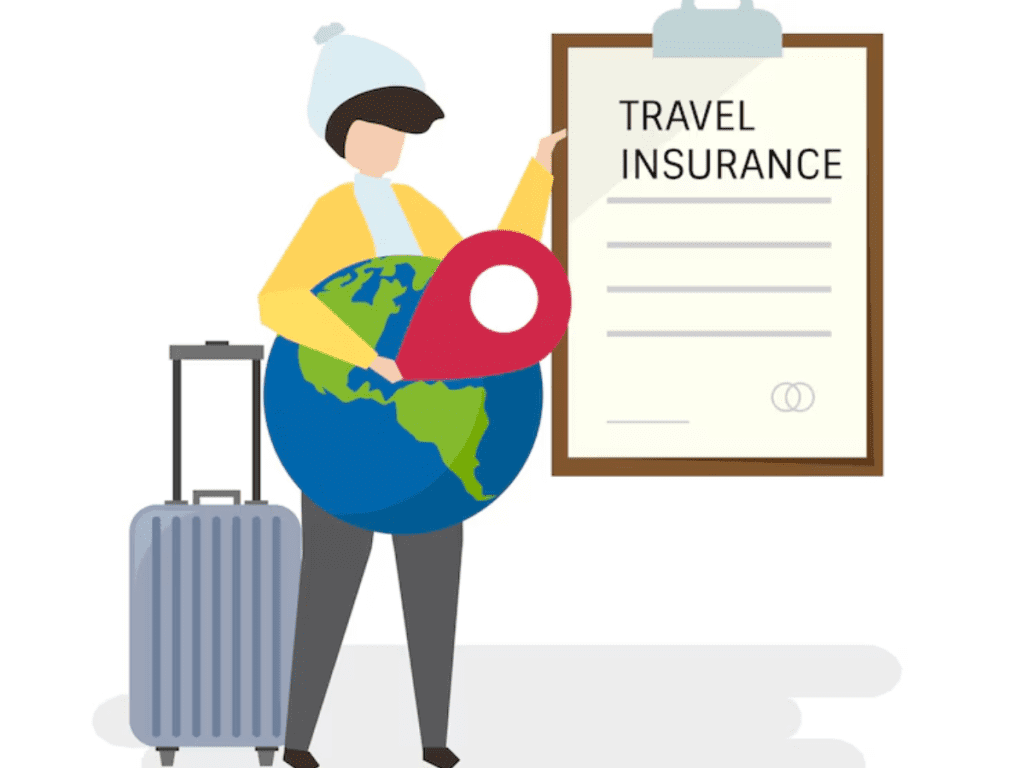Introduction
Traveling overseas is a thrilling venture to discover new cultures, learn about different environments, and create long-lasting memories. Nonetheless, while the adventure and discovery can be thrilling, there are some dangers inherent in traveling, i.e., the possibility of getting sick or injured. Although travel insurance is strongly advisable to shield the traveler from unintended medical bills, it is something that not every person considers buying or even takes into account. Whether because of budget limitations, forgetfulness, or lack of knowledge regarding the necessity of acquiring it, some travelers are never covered when emergency strikes. This post offers a step-by-step guide to coping with the problems associated with falling sick or getting hurt while traveling outside one’s home country without an insurance policy for travel, giving useful tips and practical advice on how to go about it.
Appreciate the Necessity of Seeking Medical Attention Promptly
The most important and first step to take upon getting ill or injured while overseas is to give your health its top priority. No matter if you do or do not have travel insurance, your health always comes first. In cases where the illness or injury is serious or life-threatening, you need to get medical help right away. If the problem is not immediately life-threatening, you still need to think about your condition and whether or not it could get worse if you don’t treat it. If you have symptoms like trouble breathing, profuse bleeding, or loss of consciousness, it is crucial that you seek emergency medical attention immediately.
Most nations possess local emergency services which can be reached by dialing certain numbers, which are usually displayed at hotels, airports, or tourist information booths. For example, in the United States, 911 is the emergency number, and for the European Union, you can call 112 for emergencies. Ensure that you have access to the relevant contact information of medical services in the region you are visiting, and never be afraid to seek assistance from locals if you are not sure what to do.
Take into Account the Severity of the Illness or Injury
Not all conditions will demand emergency treatment, and if the condition is not urgent, then you can access treatment at a nearby clinic or health center. Most nations, particularly those within Europe, Asia, and Latin America, also have low-cost health care programs that can provide instant care at little expense as opposed to higher prices usually present in countries like the United States or Canada. No matter how serious your injury or illness is, it’s essential to assess your symptoms and determine if you should go to a hospital or if a trip to a nearby doctor or pharmacy will do. For less serious ailments such as food poisoning, mild fevers, or minor cuts and bruises, it’s possible to visit a local healthcare provider who may be able to treat your condition at a much lower cost compared to larger hospitals.
If your illness or injury needs long-term or specialized care, you might need to locate a hospital with proper facilities. The sooner you can take care of it, the better. But be ready for the fact that treatment might not be free, as in many nations patients are expected to pay in advance for healthcare services, particularly if they are not covered by insurance.
Learn About the Local Healthcare System
When abroad without insurance, you need to learn about the local healthcare system as soon as possible. Each nation has its own rules and procedures regarding healthcare, so it is crucial to know what resources you can expect. For instance, a few nations have a public healthcare program in place that provides services at no cost or a very low fee to locals and visitors alike, while others expect a payment before any medical care will be given.
In most European nations, particularly those belonging to the European Union (EU), EU citizens are entitled to fundamental healthcare in their European Health Insurance Card (EHIC). This card ensures that citizens of the participating countries can be treated at the local rates. Even for non-citizens from outside the EU, some nations have reciprocal health agreements, which may grant them access to discounted medical care. In certain cases, medical practitioners do not charge foreign visitors directly but rather deal with embassies or governments abroad to cover expenses.
In privatized healthcare countries, like America, medical care can be very costly, particularly if you lack insurance. You should know that in these nations, even minimal services like a visit to the doctor can cost a lot, and without insurance, you will pay the entire cost of treatment.
To get help, reach out to your Embassy or Consulate
If you are in the unfortunate position of being injured or ill overseas and without travel insurance, calling your embassy or consulate is one of the first things you should do. Embassies can be very useful in helping you navigate a foreign healthcare system. They usually give you a list of reliable hospitals, clinics, and doctors in the region that you can go to, and they may help you negotiate with local medical providers.
While embassies cannot usually pay for your medical treatment, they can provide advice and assistance to explain your options to you. They might refer you to overseas medical centers that have arrangements for treating patients who have no insurance, and sometimes they can even assist you in payment plans or help you make arrangements with family members or friends back home to provide the money.
In addition, if your condition necessitates evacuation back home to your native country for ongoing medical treatment, embassies can help in facilitating the process of evacuation, although the fee associated with such a service is usually exorbitant and would most likely have to be paid by you or a third party. Embassies in some instances may also assist in the coordination of medical evacuation insurance coverage, although this is not always the case.
Investigate Financial Resources and Assistance Options
Medical costs accumulated while abroad can quickly mount up, especially if you need extended care, advanced treatment, or emergency evacuation. Without insurance, you might be overwhelmed by the cost. The good news is that there are a few alternatives that might be able to lighten the load on your wallet. First, if you carry a travel benefits credit card, see whether it has emergency medical expense coverage. Some premium credit cards come with some kind of travel insurance, and that can include coverage for medical emergencies during travel. Even if you do not have full coverage, your credit card company might provide help in times of emergency.
Besides that, there are also a number of crowdfunding sites that you can use to finance your medical bills. Sites such as GoFundMe, JustGiving, or even social media platforms like Facebook make it possible for individuals to post their personal story and solicit donations from friends, relatives, and even strangers who wish to assist them. Although this might not be your preference, it can be an effective means of obtaining the funds necessary to cover your medical expenses, especially if your condition is severe.
Explore Medical Evacuation or Repatriation
Sometimes, the best for your health is to be evacuated to a hospital in your native country. This is particularly true if you’re in a country with limited healthcare infrastructure or if your medical condition requires specialized care not available in your current location. Medical evacuation, or repatriation, is a service offered by many private medical facilities, though it can be extremely costly. You’ll need to be prepared for the fact that medical evacuations, especially those that require airlifting or other forms of transportation, can amount to tens of thousands of dollars.
If you do not have travel insurance, but are in a position to need to be evacuated, you can look into membership associations that provide medical evacuation services. These have a lower initial cost and are less expensive than normal travel insurance, so it is a good option to consider if you are an avid traveler. Even if you need to pay out of pocket for medical evacuation, you should make a rapid decision if your situation justifies it.
Pursue Potential Reimbursement from Insurance
In case you’re already out of the country and are facing medical bills with no travel insurance, don’t lose hope thinking reimbursement is not an option. Certain travel insurance companies provide coverage that can be bought retroactively after the issue occurs, meaning you could buy insurance even if you’ve already suffered a medical condition. Although this will not assist with direct costs, it may enable you to claim back some of the costs of your healthcare. The process is however frequently convoluted and you’ll have to submit detailed documentation like receipts, hospital statements, and doctor’s reports to support your claim.
It’s wise to read the terms and conditions of any insurance you buy, since policies for reimbursement can be highly variable. Some insurance policies cover only specific medical problems or emergencies, and there could be exclusions depending on specific timing or circumstances of illness or injury. Carefully read the small print in buying insurance and making claims.
Prepare for Future Travel with Insurance
Although it’s good to have an idea of what to do should you fall ill or get injured while overseas without travel insurance, the best solution is to prevent such occurrences from happening in the first place by buying travel insurance. Travel insurance provides economic cover in case you fall ill, get hurt, or experience other emergency-related issues, including the payment for medical care, evacuation, and so much more. Although the price of travel insurance depends on the country you’re visiting, the duration of your stay, and the extent of coverage you want, it is typically a modest investment relative to the expense of medical treatment overseas. Prior to any trip, particularly to nations with expensive healthcare or limited medical facilities, think about getting travel insurance to protect your health and finances. Insurance can give you comfort and confidence that you’re covered in the event of unforeseen circumstances.
Conclusion
Getting ill or hurt overseas without traveling insurance is an anxious and harrowing experience, but by equipping yourself with the proper information and preparation, you can control the situation professionally.
Begin with immediately accessing healthcare services and getting familiar with costs and medical care available to you in the visited country. Don’t hesitate to contact your embassy for assistance, and look into possibilities for financial aid, including credit card benefits or crowdfunding. If required, look into medical evacuation or repatriation, and be mindful that some travel insurance companies provide reimbursement for previous medical bills. Yet, the best means of safeguarding yourself in the future is to always purchase travel insurance prior to traveling abroad. This provides you with the assurance of financial protection so that you can enjoy your trip without fear of unexpected medical problems.

